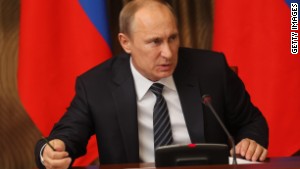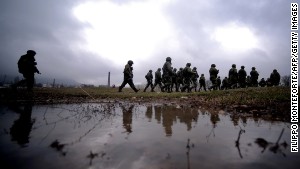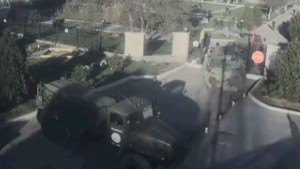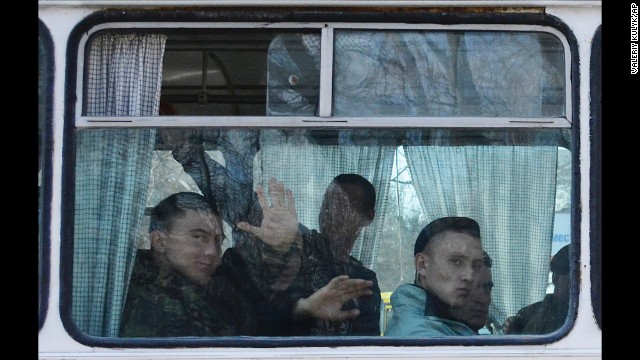Ukraine's parliament ousts defense minister
March 25, 2014 -- Updated 2039 GMT (0439 HKT)
STORY HIGHLIGHTS
- About 30,000 Russian forces near Ukraine border, according to U.S. estimates
- Negotiate with Kiev and be prepared to "act responsibly," Obama tells Russia
- Kremlin says it's interested in maintaining contacts with G8 partners
- A Ukrainian far-right leader was killed in a gunfight with police, government says
Kiev, Ukraine (CNN) -- Ukrainian lawmakers on Tuesday dismissed acting Defense Minister Ihor Tenyukh over his handling of the Crimea crisis following Russia's annexation of the Black Sea peninsula.
Parliament voted to appoint Col.-Gen. Mykhailo Koval as his successor. Koval's name was submitted for parliamentary approval by acting President Oleksandr Turchynov.
Ukrainian news agency Ukrinform said Tenyukh had tendered his resignation.
"Knowing that someone does not like what I did as acting defense minister, as well as due to disagreements in the issues that were offered from the first day until present regarding the Autonomous Republic of Crimea ... I ... am handing in my resignation," it quoted him as saying.
Tenyukh was Ukraine's acting defense minister as troops wearing unmarked uniforms -- which the West said were Russian forces -- surrounded Ukrainian bases in Crimea this month. Russia annexed Crimea last week after a controversial referendum that Ukraine and the West say was illegal.




The new leaders in Kiev, who took office after months of protests forced pro-Moscow President Viktor Yanukovych from office, say Crimea is still a part of Ukraine.
Russia snubbed at summit
Russia insists its actions are legitimate. Crimea belonged to Russia until 1954 when it was given to Ukraine, which was then part of the Soviet Union. The region has a majority ethnic Russian population and other long historic ties to Russia.
Speaking at The Hague on Tuesday, U.S. President Barack Obama said Russia had a way out of tensions over the crisis: Negotiate with Kiev and be prepared to "act responsibly" and respond to international norms, such as respecting Ukraine's territorial integrity.
If Russia doesn't act responsibly, "there will be additional costs" that could hurt the global economy but will affect Russia most of all, Obama said at the Nuclear Security Summit in the Netherlands.
He added that Russia's annexation of Crimea "is not a done deal" because it's not internationally recognized. But he acknowledged that the Russian military controls Crimea, and said the world can make sure, through diplomacy and sanctions, that Russia pays a price.
"I think it would be dishonest to suggest there is a simple solution to resolving what has already taken place," Obama said, dismissing any suggestion that Russia's intervention in Crimea -- and hints that it could intervene in Ukraine to support Russian speakers -- was similar to NATO's intervention in Kosovo.
Obama also said Russia was more isolated now than it was roughly five years ago during its war with the former Soviet republic of Georgia, and more than it was during most of the 20th century when it was the Soviet Union.
Moscow has doggedly pursued its own course, even as Western leaders have denounced its actions as violations of Ukraine's sovereignty and a breach of international law.
In what has become the biggest East-West confrontation since the Cold War, the United States and European Union have imposed visa bans and asset freezes on some of Russian President Vladimir Putin's closest political and business allies. Russia responded with its own list of sanctions against a number of U.S. lawmakers and officials.
The G7 group of leading industrialized countries has condemned both the Crimean vote to secede and Russia's annexation of Crimea. Russia has now been excluded from what was the G8. Moscow had joined the G7 group in 1998 to form the G8.
Russia initially reacted to the snub by saying "the G8 is an informal organization that does not give out any membership cards and, by its definition, cannot remove anyone."
But on Tuesday, the Kremlin said it wants to maintain contact with G8 partners.
"As for the contacts with the G8 countries, we are ready for them, we are interested in them, but the unwillingness of other countries to continue the dialogue, in our view, is counterproductive both for us and our partners," presidential spokesman Dmitry Peskov told Russia's state ITAR-Tass news agency.
Ahead of the G7 gathering, a representative for British Prime Minister David Cameron said that no G8 meeting would take place in Russia this year as previously planned.
Concerns over military buildup
Also at the nuclear summit Monday, Russian Foreign Minister Sergey Lavrov met his Ukrainian counterpart, Andrii Deshchytsia, and, separately, U.S. Secretary of State John Kerry.
During his meeting with Lavrov, Kerry expressed concern about Russian troops amassed on the Ukrainian border, U.S. State Department spokeswoman Marie Harf said.
Other officials, including NATO's top military commander, have already expressed concern about the buildup of Russian forces on Ukraine's border.
Russia has added 10,000 troops, along with air defense artillery and wheeled vehicles, to its positions near Ukraine's eastern border in the last week to 10 days, according to a U.S. official with knowledge of the situation. Russian forces in the vicinity now total 30,000, according to U.S. estimates.
Russia had maintained a level of about 20,000 troops in the area but began reinforcing and adding to their positions in recent days, the official said, leading to U.S. concern that they are positioned to move into Ukraine if and when they are ordered to do so.
Separately, a senior U.S. defense official told CNN that Russia "has enough troops that we believe they could move against Ukraine at any time now." The official emphasized the United States still does not know Russia's intentions on the border despite statements by its defense minister that the troops are there only for exercises.
U.S. intelligence also indicates the Russian forces are positioned possibly to go after three Ukrainian cities -- Kharkiv, Luhansk and Donetsk -- to establish a "land bridge" of access into Crimea. Russian forces have moved so close to the border, there would be no warning time, and the United States would likely only see an incursion as it was happening.
Russian forces are currently positioned in and around Rostov, Kursk and Belgorod, according to U.S. intelligence information.
Far-right group leader killed
Separately, a Ukrainian leader of a far-right group was shot dead in what Ukraine's Interior Ministry called a shootout with police.
Ukrainian special forces were trying to arrest Oleksandr Muzychko, better known as Sashko Biliy, in a cafe in the western city of Rivne, the ministry said. Muzychko was wanted "for his criminal background and illegal carrying of weapons," the ministry said.
"He tried to escape and used gun shots against the police," the ministry said. "Shots were fired in response, injuring Muzychko, who died soon after."
Muzychko was a leader of Right Sector, a far-right group prominent in the recent anti-government protests. Three others were arrested and taken to Kiev, the ministry said.
A Ukrainian lawmaker, Oleksandr Doniy, whose constituency is in Rivne, gave a different version of events. In a post on his Facebook page, he said two vehicles had forced Muzychko's car to stop, and he had then been dragged into one of the other cars.
"Then they threw him out of the car on the ground, with hands handcuffed behind his back, and shot twice in his heart," Doniy wrote, without saying where he got his information.
CNN's Barbara Starr, Boriana Milanova, Anna Maja Rappard and Jason Hanna contributed to this report.
We recommend
From around the web
Russia's affront to international order poses global risks(Nikkei Asian Review)
Content Optimisation: Bringing the horse to water, and making it drink too(Marketing Interactive)
Things to Do in Fredericksburg and the People who will Love it here(Priority Corporate Housing)
March 20, 2014 -- Updated 1003 GMT (1803 HKT)
Putin sees Russia -- long the world's largest country -- as a victim of both the West and Communists, writes Alexander Motyl.
March 20, 2014 -- Updated 1105 GMT (1905 HKT)
Cheers in Moscow. Fear in Kiev. And jeers from the West as admonition and sanctions pour in.
March 19, 2014 -- Updated 1107 GMT (1907 HKT)
"The answer depends on what your perspective is," said David Rothkopf, editor of Foreign Policy magazine.
March 19, 2014 -- Updated 1156 GMT (1956 HKT)
The situation in Ukraine remains tense after Crimea's annexation, and citizens find it difficult trying to anticipate what comes next.
March 18, 2014 -- Updated 1036 GMT (1836 HKT)
West needs to frighten Putin, to prevent him moving in to other regions, writes Simon Tisdall.
March 18, 2014 -- Updated 1403 GMT (2203 HKT)
A former Kremlin adviser says Putin has gone too far to pull back -- regardless of sanctions.
March 18, 2014 -- Updated 1444 GMT (2244 HKT)
CNN's Ivan Watson reports on the Ukrainian reaction to the Russian treaty with Crimea and plans to annex the region.
March 14, 2014 -- Updated 0958 GMT (1758 HKT)
Experiences from five days in Crimea
March 25, 2014 -- Updated 1407 GMT (2207 HKT)
Images from Crimea, Donetsk, Kiev and elsewhere as the future of Ukraine lies in doubt.
March 13, 2014 -- Updated 2159 GMT (0559 HKT)
Peter Morici: He says Europe must move quickly to develop its own gas and oil industries.
Visually compare Ukraine and Russia's military forces in our infographic:
March 21, 2014 -- Updated 0121 GMT (0921 HKT)
Scenes from Ukraine and Crimea, captured by CNN teams
March 1, 2014 -- Updated 2111 GMT (0511 HKT)
It's a conflict culled from the pages of the Cold War. With Ukraine possibly teetering on the brink of war, here are three things you need to know.
The current crisis is largely fueled by Ukraine's mixed loyalties and linguistic divisions. See where the country is split.
Have you witnessed the protests in Ukraine? Send us your images and video, but please stay safe.
Most Popular
Today's five most popular stories
 Ukrainian marines wave as they leave a base in Feodosia, Crimea, on Tuesday, March 25. After Russian troops seized most of Ukraine's bases in Crimea, interim Ukrainian President Oleksandr Turchynov ordered the withdrawal of armed forces from the peninsula, citing Russian threats to the lives of military staff and their families.
Ukrainian marines wave as they leave a base in Feodosia, Crimea, on Tuesday, March 25. After Russian troops seized most of Ukraine's bases in Crimea, interim Ukrainian President Oleksandr Turchynov ordered the withdrawal of armed forces from the peninsula, citing Russian threats to the lives of military staff and their families.

































No comments:
Post a Comment